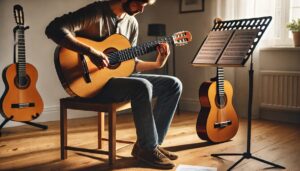The guitar remains one of the most popular musical instruments in the world, and in Slovenia, interest in learning to play it has not diminished over the years. However, with the development of technology and the changing lifestyles of learners, guitar schools have begun facing new challenges. Traditional forms of teaching are gradually giving way to hybrid models that combine in-person lessons, digital platforms, and interactive tools. In the context of digital transformation, guitar schools not only maintain their relevance but also find new ways to engage students of all ages.
Online Courses and Video Lessons as an Alternative
One of the main changes has been the active implementation of online learning. Video lessons, streams, and Zoom classes have allowed schools to go beyond physical classrooms and attract students from various regions of Slovenia. Today, a student from Maribor can study with a teacher from Ljubljana without leaving home. Many schools create their own libraries of video lessons available 24/7. This is convenient for those who cannot attend classes regularly or prefer to study at their own pace. Moreover, digital courses provide students with access to numerous additional materials — tablatures, chord charts, and self-practice exercises.
Interactive Apps and Digital Assistants
Virtual technologies are increasingly being integrated into the educational process. Guitar schools in Slovenia actively use apps and programs that help students practice technique, track rhythm and intonation. Tools such as Yousician or Fender Play have already become an essential part of learning for many students. They allow learners to instantly see their progress, receive feedback, and even compete with other students. Thanks to gamification, the learning process becomes more engaging and motivating. Some schools are developing their own apps tailored to their teaching methods to make lessons even more personalized.
Social Media and New Forms of Interaction
Social platforms also play a growing role in the lives of modern guitarists. Guitar schools actively use YouTube, Instagram, and TikTok to share mini-lessons, promote their courses, and inspire students. These short formats are especially popular among young people and help engage even those who initially didn’t plan to study seriously. In addition, social media becomes a space for communication and support: students can share their achievements, participate in challenges, and receive comments from teachers and fellow musicians. This creates a sense of community and makes learning more lively and inclusive.
Teacher Adaptation and the Role of the Hybrid Approach
However, the transition into the digital age also requires adaptation on the part of teachers. Many instructors have undergone additional training to learn how to work effectively in online environments, create quality video content, and interact with students remotely. This takes time, effort, and a rethinking of teaching methods. Nevertheless, most guitar schools in Slovenia have successfully gone through this process. Today, hybrid formats are increasingly common: part of the lessons are held in person, part online. This approach combines the live atmosphere of classes with the convenience of digital technology. It’s especially useful for busy adults who can combine in-person lessons with evening online sessions.
New Horizons: International Masterclasses and Collaborations
Digitization has also opened up another prospect — international cooperation. Guitar schools in Slovenia increasingly organize online masterclasses featuring musicians from other countries. This allows students to gain unique experience, learn different playing styles, and broaden their musical horizons. Such events not only raise the level of education but also provide inspiration. This is especially valuable for young guitarists who dream of the stage and a global music career. The online format allows participation in such events without the need to travel, making education more accessible.
The Future of Guitar Education in the Digital World
Guitar schools in Slovenia are confidently looking to the future. The use of digital platforms, the integration of apps and social networks, and flexible teaching methods help make learning more accessible, engaging, and effective. Despite technological progress, live communication with a teacher and the atmosphere of a music classroom remain an important part of every student’s journey. The balance between tradition and new opportunities shapes the modern face of music education. The digital age does not replace guitar schools — it expands their possibilities, allowing every student to find their own rhythm, style, and path to mastery.


